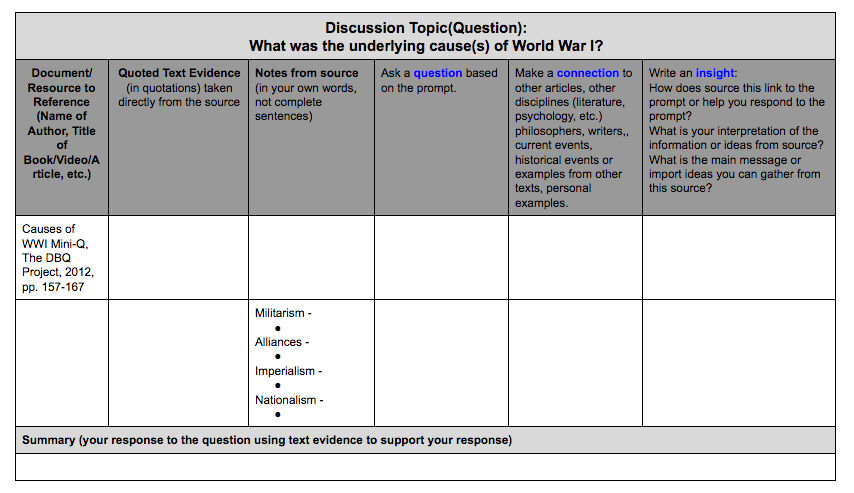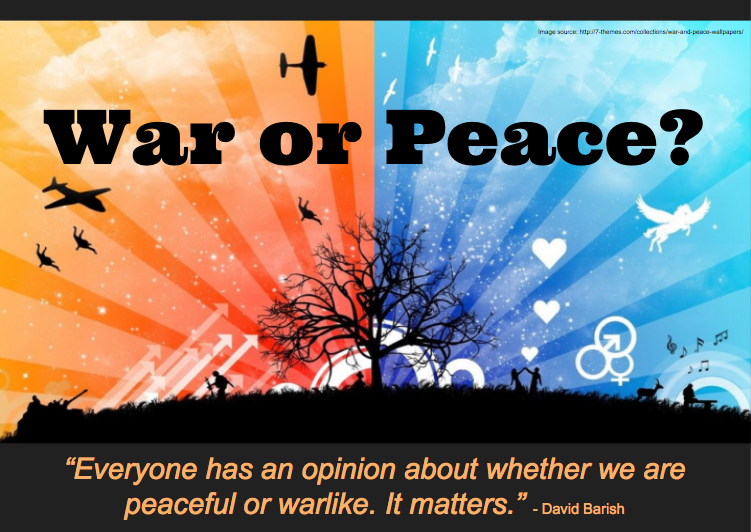|
Today, you will participate in an informal practice debate. This is NOT graded and there will be no comments added to Powerschool for this (not this time). Helpful links for today's class: Informal Debate on WWI Presentation (with links) Debate Planning document (one member of your group needs to make a copy of this) After the debates...and after your research on WWI...Let's find out which cause YOU personally believe was the most significant underlying cause of WWI... HW/Prep: Develop 1-page outline for argumentative essay; due next class timeYour homework is to prepare a 1-page outline for an argumentative essay to respond to the following essay prompt:
"What was the most significant underlying cause of World War I?" You may select any one of the 5 causes: (it does not have to be --but can be -- the one you were assigned to within your group for debate) Militarism Alliances Imperialism Nationalism Assassination Use the outline template provided (in your WH Drop folder). There are helpful links within the template to help guide you for outlining an argumentative essay. This outline is due next class and you will write a 4-paragraph formative argumentative essay next class period. A Blocks: Outline due Thurs., Jan. 26 @ start of class B Blocks: Outline due Wed., Feb. 1 @ start of class
Causes of WWI - DBQ TasksToday you will work to improve the DBQ packet. You will complete task #1. Helpful resources for today's class. HW: Research MAIN Causes of WWI, take notes, and answer: "What was the underlying cause(s) of WWI?"Complete the table in your Unit 3 notes document (in your WH Drop folder). You may use any resource to help you answer this question.
Many resources will be provided to you within the MAIN Causes of WWI Presentation (articles, videos, presentations, websites)--which ones you use are up to you. In your notes, be sure to include the MAIN causes and some information on each one of them--your notes should be organized in a way that allows you to easily see details for each of the main causes: Militarism, Alliances, Imperialism, Nationalism.
A Blocks: Due Tuesday, Jan. 24th B Blocks: Due Wednesday, Jan. 25th
HW: Schoology Discussion: "Are we more warlike or more peaceful"?"Everyone has an opinion about whether we are peaceful or warlike. It matters." - David Barash
After reading and discussing the article "War or Peace" by David Barash, and after a brief search for any further examples that support your own viewpoint on this topic, please spend 15 minutes summarizing your view on whether we (humans) are indeed more warlike -- or more peaceful. Use text evidence from the article (and any other information you find in your brief search) to support your views. You may also use any other examples (personal, current events, historical) to support your views as well. Afterwards, you will be asked to read through other students' responses and before next class, respond to at least 2 other student's responses: 1 follow up response to a student that has a similar viewpoint to yours and 1 follow up response to a student that has an either an opposing viewpoint to your own views--or a different degree of opinion (think of the spectrum/line activity in class). Remember, we learn both from those who share our viewpoints as well as learn from others with different viewpoints |
Mrs. Stewart's CourseYou'll find a daily agenda posted here for each day that class meets Archives
May 2020
Categories |


 RSS Feed
RSS Feed